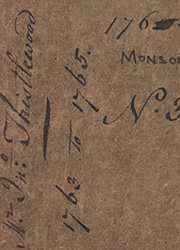
The Beinecke Library recently completed the digitization of the papers of Jamaican planter and slaveowner, Thomas Thistlewood.
Thomas Thistlewood (1721-1786) was born in Lincolnshire and emigrated to Jamaica in 1750. He began his life there as an overseer of sugar plantations, principally of John Cope's large Egypt plantation in Westmoreland, and in 1767 purchased his own plantation, Breadnut Island, where his slaves raised provisions and livestock. Thistlewood also pursued scientific and intellectual interests, keeping a detailed weather record and collecting a substantial library. He never married, but had one son, Mulatto John (d. 1780), by his slave Phibbah, who was originally a slave of his employer. Thistlewood eventually purchased her and lived with her at Breadnut Island; he called her his "wife" in the will that freed her.
The papers consist of diaries, weather journals, commonplace books, reading notes and other materials documenting Thistlewood's life, work, and intellectual interests. His 37 diaries contain daily entries dating between 1750 and 1786. Topics include Thistlewood's work as an overseer, and later owner, of slaves, including his methods of assigning work, allotting provisions, and discipline; his personal and sexual relationships with several slaves, including his lengthy relationship with Phibbah; and slave rebellions and rumors of rebellions, including Tacky's Revolt (1760). There are also thirty-four annual weather journals containing daily summaries, including precipitation measurements, and diaries from 1764-1767 that contain separate lists of daily Fahrenheit temperatures and rainfall amounts.
For more details, read the Beinecke blog.